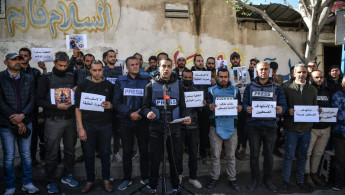Silence in Egypt over killing of Palestinian journalist in Gaza for Cairo-based Al-Ghad TV
The killing of Palestinian 27-year-old TV journalist Yazan Al-Zuweidi, who worked for the Cairo-based satellite TV channel Al-Ghad, in an Israeli attack on Gaza has unexpectedly sparked limited reactions in Egypt so far.
The tragic death of Zuweidi came on Sunday as the onslaught on the Palestinian strip marked 100 days since it first broke out on 7 October last year.
Zuweidi had covered wars and various events taking place in Gaza over the past six years while working for the Egyptian private TV channel.
"Al-Ghad channel mourns the…colleague and all… the martyred coworkers, holding Israel accountable for targeting journalists…in Gaza," the Egyptian TV station posted on X, formerly known as Twitter, "calling on international human rights groups to denounce the Israeli crimes against free expression."
اسـ.ـتُشهد مصور قناة «الغد» في شمال غزة الزميل يزن الزويدي، اليوم الأحد، إثر استهداف قوات الاحتـ..ـلال له.
— قناة الغد (@AlGhadTV) January 14, 2024
وإذ تنعى قناة «الغد»، الزميل المصور الصحفي وجميع الزملاء الصحفيين الشهـ..ـداء، تُحمِّل قوات الاحتـ..ـلال الإسرائيلي المسؤولية عن استهداف الصحفيين والطواقم الإعلامية في غزة،… pic.twitter.com/ZQ5c2dqA6A
At least 82 other journalists and media professionals, mostly Palestinians, have been killed since the Israeli war on Gaza first erupted, according to the Committee to Protect Journalists.
The United Nations had earlier voiced concerns over the number of journalists who lost their lives during the war on Gaza, one day after two Al Jazeera staffers died in an alleged Israeli attack on their car.
The Jazeera Network has frequently accused Israel of deliberately targeting its journalists while on duty and dismissed Israeli denials as "false and misleading."
Prominent political sociologist Sadek Dr Snaid Sadek argued that "the low-key Egyptian reactions reflect an official policy of no loud outcry."
"Egypt seems to have opted for limited official comments to avoid any escalation with Israel, letting its media tools or [uninfluential] officials object," Sadek told The New Arab.
"Gaza has witnessed the highest number of journalists killed in such a short period. Journalists have scandalised Israel in Gaza and cannot be excluded from being targeted deliberately to scare off reporters or to tone down their coverage," Sadek argued.
Israel's war on Gaza has so far claimed the lives of about 23,000 Palestinians, while almost 85 per cent of Gaza's population has been internally displaced, according to official figures.
Last week, the Egyptian Journalists' Syndicate granted an award to Palestinian Jazeera bureau chief Wael El-Dahdouh, who had lost most of his family members, including his wife and son, because of Israeli attacks.
Egypt and Israel have technically been at peace since the late 1970s, sharing solid diplomatic, economic, and security ties– despite widespread opposition from the Egyptian public.
The Egyptian government has remained impartial towards the South African case against Israel before the International Court of Justice, accusing the Zionist state of committing genocide against Gazans, prompting activists, political parties, and professional syndicates to urge Egypt to enforce decisive measures under the UN Genocide Convention.'
"This is not a good time for Egyptian policy-makers to suggest aggressive reaction. Egypt has been undergoing tough economic problems as a high-level Egyptian delegation was in Washington recently to garner the support of the US and the International Monetary Fund," Sadek concluded.




 Follow the Middle East's top stories in English at The New Arab on Google News
Follow the Middle East's top stories in English at The New Arab on Google News

![A group of Palestinians, foreign and Israeli activists gather to participated in an olive picking event on the land in the town of Battir, which is under threat of confiscation by Israel in Bethlehem, occupied West Bank on 8 November 2024. [Getty]](/sites/default/files/styles/image_330x185/public/2182930803.jpeg?h=199d8c1f&itok=__0LgGsa)
